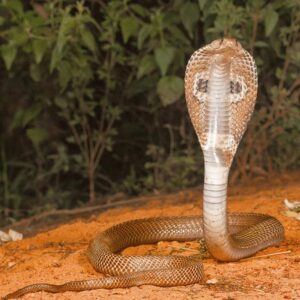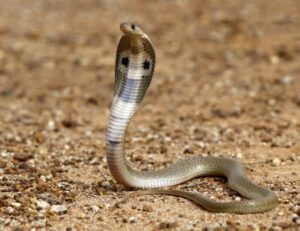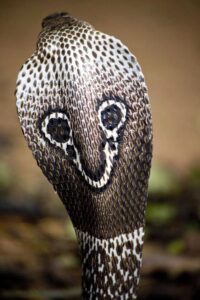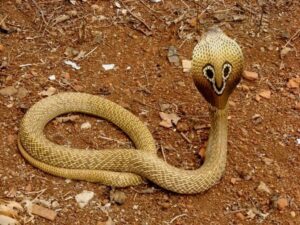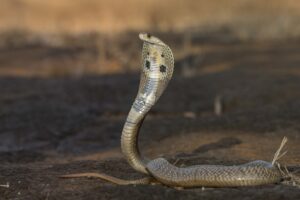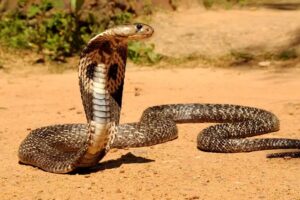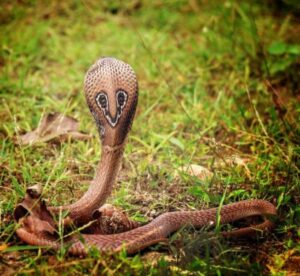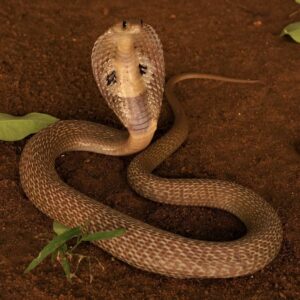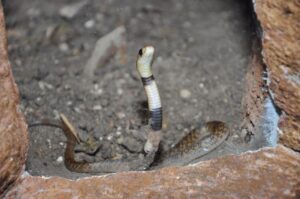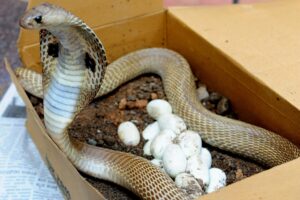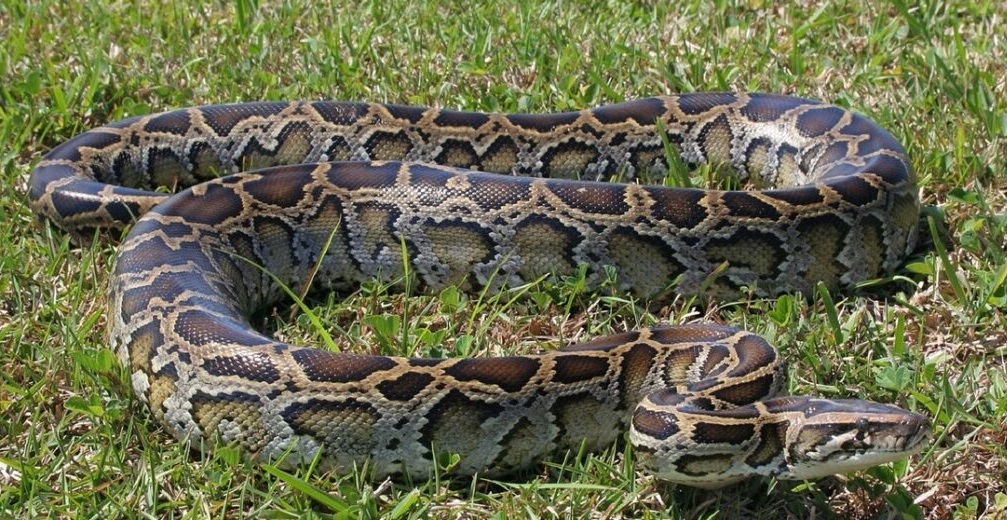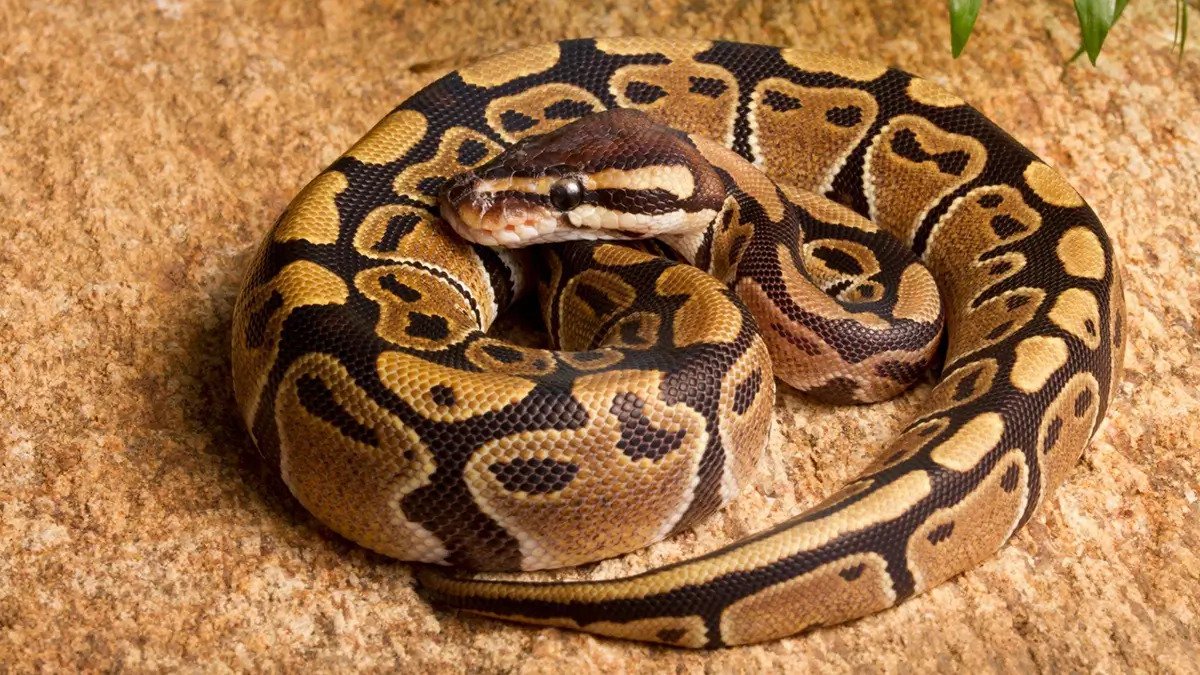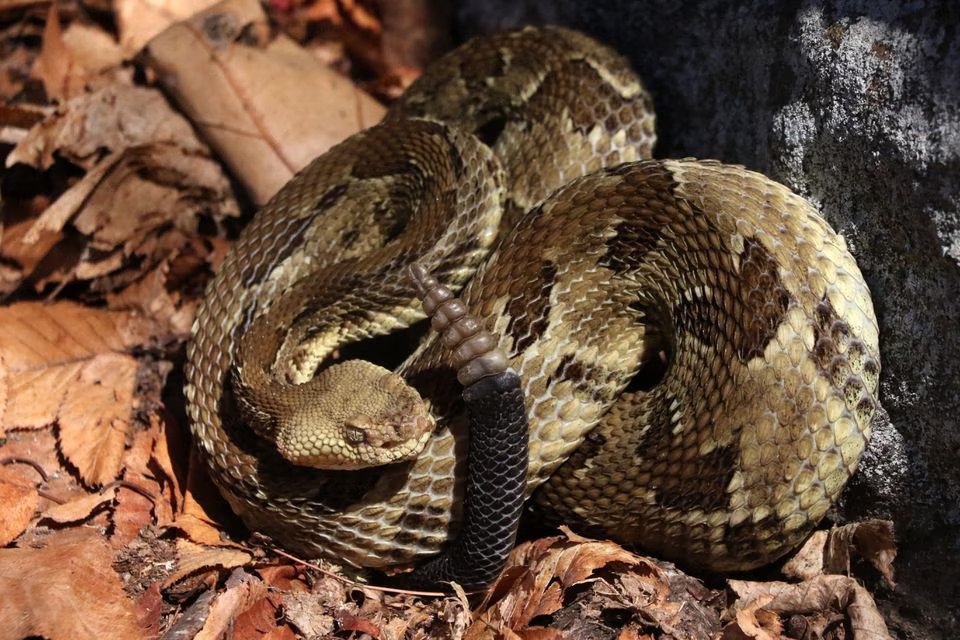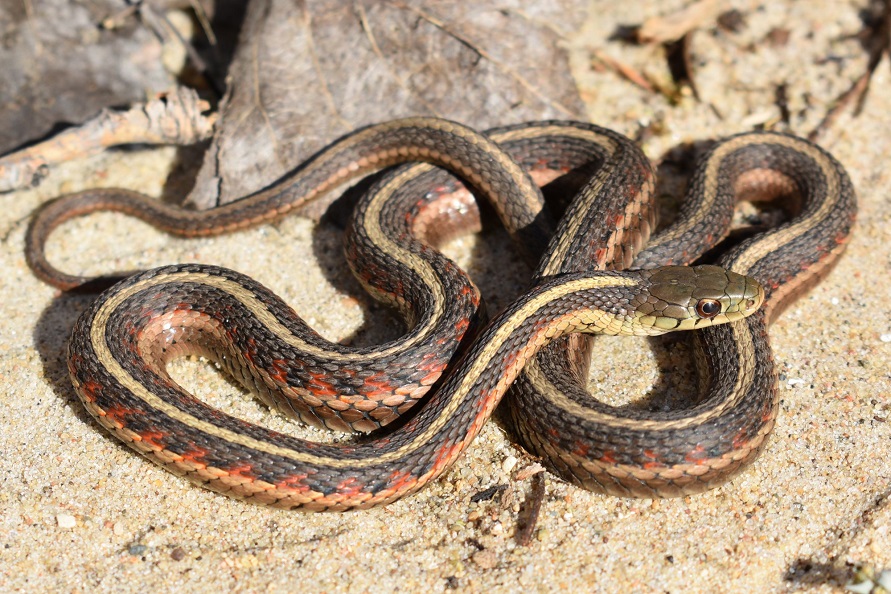The Indian cobra, also called the Asian cobra, binocellate cobra, or spectacled cobra, is one of India’s four venomous snakes with the highest fatality rates, collectively known as the “Big Four”.
In 1758, Swedish zoologist Carl Linnaeus first described this species. The term ‘naja‘ in their name derives from the Latinized Sanskrit word nāgá meaning “snake”. Austrian naturalist and zoologist Josephus Nicolaus Laurenti first described the genus’ naja‘ in 1768. Later it was divided into four subgenres ‘Naja‘, ‘Afronaja‘, ‘Boulengerina‘, and ‘Uraeus‘, with the Indian cobra being the first original species in both the entire genus and the subgenus ‘Naja‘. Until 1990, every species within this genus was considered a subspecies of the Indian cobra.
Ancient princely states of India, like Gondal, Gwalior, Kalahandi, Kolhapur, Pal Lahara, and many others, used the Indian cobra as a heraldic element in their official symbols.
Scientific Classifications
- Suborder:Serpentes
- Family:Elapidae
- Genus:Naja
- Species:N. naja
Conservation Status
Description
Size
The average length of an Indian cobra can reach up to 6-7.25ft (1.8-2.2 m) and weigh about 4.5-6.5 lbs (2-3 kg). Few Sri Lankan specimens can grow up to 6.9-7.2 ft (2.1-2.2 m), but it is very rare.
Color and Appearance
These snakes have long, heavy bodies with tapered tails and elliptical heads that are depressed and somewhat distinct from the necks. They have short rounded snouts, large nostrils, and medium-sized eyes with round pupils. Their coloration ranges between brown, black, grey, and reddish, covered in yellow and white markings, sometimes forming bands across them. The underside of their bodies is light colored, white being typical. Most specimens possess a U-shaped mark on the dorsal side of their hood, which resembles a curve line connecting two circular ocelli patterns. Also, apart from the northwestern specimens, most individuals possess two lateral spots on their throats at the meeting point of dorsal and ventral scales.
They have 171–197 ventral scales, 21–25 dorsal scale rows at the midbody with the scales being smooth and strongly oblique, 48–75 subcaudal scales with a single anal shield, 7 upper and 9-10 lower labial scales, and 2+3 temporal scales.
Are they Dangerous
The Indian cobra is venomous and extremely dangerous. They have powerful bites, with their venom having an LD50 value of 0.28 mg/kg, yielding up to 150.0 – 600.0 mg per bite. It contains post-synaptic neurotoxin and cardiotoxin, acting on synaptic gaps of the nerves, leading to muscle paralysis. The presence of enzymes like hyaluronidase in the venom causes it to spread at an increased rate by causing cell membranes to rupture.
Symptoms of envenomation might show within 15 minutes to two hours after being bitten.
Some early systemic symptoms are dizziness, drowsiness, headache, intoxication, nausea, vomiting, and weakness.
The potency of their venom varies depending on their range; for instance, In Pakistani specimens, the LD50 value has been recorded to be about 0.22 mg/kg, while Indian specimens have a value of around 0.84 mg/kg.
In severe cases, the victims may go into cardiac arrest and undergo respiratory failure. With human settlements being one of their most common habitats, accidental bites often occur, making the fatality rate of Indian cobra bites high. One of the most affected countries is India.
Indian Cobra Snake At a Glance
Distribution
The distribution of the Indian cobra ranges across Pakistan, Afghanistan, Bangladesh, India, Nepal, and Sri Lanka.
In Drosh, the Chitral Valley, the occurrence of this species has been noticed, which indicates that the Kabul River Valley in eastern Afghanistan may also have specimens living there. They have also been observed in Bhutan.
Habitat
They prefer a wide range of habitats, inhabiting agricultural lands like rice paddy fields and wheat crops, dense as well as open forests, rocky terrains, wetlands, and sometimes heavily populated urban and suburban areas. Indian cobras do not live in ‘true deserts’. These cobras occur at an elevation of the highest 6,600 ft (2,000 m) from sea level. Also, they shelter in the abandoned dens of small mammals, rock piles, tree hollows, embankments, and termite mounds and are often found near areas with water.
Lifespan
The average lifespan of an Indian cobra ranges from 17-23 years in the wild, and it is known to have lived up to 30 years in captivity.
Predators
This snake falls prey to large birds of prey like eagles and different species of mongoose.
When threatened, they assume a defensive posture by raising their upper body and spreading their hoods by expanding the flexible ribs in their necks while hissing loudly as a warning sign.
Diet
These snakes are carnivores. Their diet includes small birds, frogs, rodents, lizards, and other reptiles, even other snakes. They sometimes also consume birds’ eggs.
They hunt by injecting the prey with their venom and wait until they stop moving or die, then swallow it whole.
These diurnal species help the ecosystem by controlling agricultural pests and maintaining the prey species’ balance.
Reproduction
The breeding season of this oviparous species starts around April and lasts through July. Females lay between 10-30 eggs in places like rat holes, termite mounds, or other similar shelters hidden on the ground. Female cobras guard their eggs fiercely and only leave the nest to feed themselves. After about two months of incubation, the hatchlings emerge, measuring 8-12 inches, and can immediately hunt, spread their hoods and deliver venom.
Similar Species
Some confusion might occur between the monocled and Indian cobras due to their similar appearance. However, Indian cobras have a U-shaped hood pattern which looks like a spectacle, whereas the monocled cobras’ hood mark is O-shaped.
The Indian cobra can sometimes be confused with the Caspian cobra. This confusion may occur with those specimens of Indian cobras that lack hood marks.
Oriental Ratsnake
The Oriental ratsnake is often mistaken for the Indian cobra, but it is much longer and has a ridged appearance.
FAQs
Ans: The patterns on its body create an optical illusion acting as an excellent camouflage, making it hard for the predators to spot them in their natural habitat.
Ans: Indian cobras are longer than Chinese cobras.
Source
petrapedia.com, deccanherald.com, rahulalvares.com, i.pinimg.com, linodeobjects.com, toiimg.com, fbcdn.net, thesamikhsya.com, flickr.com

